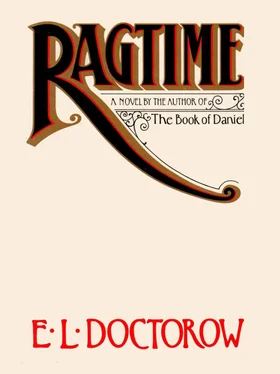Edgar Doctorow - Ragtime
Здесь есть возможность читать онлайн «Edgar Doctorow - Ragtime» весь текст электронной книги совершенно бесплатно (целиком полную версию без сокращений). В некоторых случаях можно слушать аудио, скачать через торрент в формате fb2 и присутствует краткое содержание. Жанр: Современная проза, на английском языке. Описание произведения, (предисловие) а так же отзывы посетителей доступны на портале библиотеки ЛибКат.
- Название:Ragtime
- Автор:
- Жанр:
- Год:неизвестен
- ISBN:нет данных
- Рейтинг книги:4 / 5. Голосов: 1
-
Избранное:Добавить в избранное
- Отзывы:
-
Ваша оценка:
- 80
- 1
- 2
- 3
- 4
- 5
Ragtime: краткое содержание, описание и аннотация
Предлагаем к чтению аннотацию, описание, краткое содержание или предисловие (зависит от того, что написал сам автор книги «Ragtime»). Если вы не нашли необходимую информацию о книге — напишите в комментариях, мы постараемся отыскать её.
Ragtime — читать онлайн бесплатно полную книгу (весь текст) целиком
Ниже представлен текст книги, разбитый по страницам. Система сохранения места последней прочитанной страницы, позволяет с удобством читать онлайн бесплатно книгу «Ragtime», без необходимости каждый раз заново искать на чём Вы остановились. Поставьте закладку, и сможете в любой момент перейти на страницу, на которой закончили чтение.
Интервал:
Закладка:
Mother tried to interest Grandfather in the French couple on the basis of their academic background. The old man would have none of it. He was totally engrossed in his condition and too irritable to engage in civilized discourse. He defeated all the diversions she thought up for him — except one, a daily ride in a boardwalk chair in which he could sit and be wheeled without being thought infirm. But he carried a cane across his lap and whenever the pedestrian traffic did not move fast enough for him he lifted the cane and prodded women and men alike, who would turn and stare, outraged, as he sailed past them.
There were other guest, of course, who where not Europeans: a gigantic stockbroker from New York with a huge wife and three immense children, who spoke not a word when they dined; several family groups from Philadelphia, who could be placed quickly by the nasalities of their speech. But Mother found that the persons who interested her were invariably foreigners. They were not a substantial number but seemed to beam more life than her countrymen. The most fascinating of all was a small, limber man who wore jodhpurs and a white silk shirt open at the neck and a flat white linen cap with a button. He was a flamboyant, excited person whose eyes darted here and there, like a child’s, afraid of what they might miss. He carried on a chain around his neck a rectangular glass framed in metal which he often held up to his face as if to compose for a mental photograph what it was that had captured his attention. One cloudy morning on the hotel porch it turned out to be Mother. Caught in the act he came over and in a thick foreign accent made profuse apologies. He was, he said, the Baron Ashkenazy. He was in the moving-picture business and the glass rectangle was a tool of the trade which he could not forbear using even when on vacation. He laughed sheepishly and Mother was charmed. He had shining black hair and his hands were delicate and small. She saw him next on the beach leaping about some distance away, entertaining a child at the edge of the sea, picking up things, running this way and that, and holding up his peculiar rectangular glass. With the sun behind him he was no more than a silhouette. But she immediately recognized his energetic figure, even at that distance, and she smiled.
The Baron Ashkenazy was the first guest to join Mother and Father at their table. He arrived with a beautiful little girl whom he introduced as his daughter. She was astonishingly lovely, about the same age as the boy. Mother had immediate hopes that they would become friends. Of course they sat there and said nothing and didn’t look at one another. But she was a remarkable creature, with the darkest eyes and thick hair like her father’s and a Mediterranean complexion. She wore a fine white lace dress with a satin bodice shaped by the smallest suggestion of a bosom. Father could not take his eyes off the girl. Through dinner she said nothing, nor did she smile. But the explanation was soon forthcoming, after the appetizer, in fact, when the Baron in a lowered voice, his hand going out to touch his daughter’s hand, explained that her mother had died some years before although he did not say of what. He had never remarried. A moment later he was again his ebullient self. He talked incessantly in his European accent, with malapropisms he himself recognized and laughed over. Life excited him. He dwelled on his own sensations and liked to talk about them: the taste of the wine or the way the candle flames multiplied in the crystal chandeliers. His simple delight in everything was infectious and soon Mother and Father wore constant smiles on their faces. They had forgotten themselves. It was enormously pleasurable to see the world as the Baron did, alive to every moment. He held his rectangular glass aloft, framing Mother and Father, the two children, the waiter walking toward the table and, at the far end of the dining room, a pianist and a fiddler who played for the patrons on a small platform decorated with potted palms. In the movie films, he said, we only look at what is there already. Life shines on the shadow screen, as from the darkness of one’s mind. It is a big business. People want to know what is happening to them. For a few pennies they sit and see their selves in movement, running, racing in motorcars, fighting and, forgive me, embracing one another. This is most important today, in this country, where everybody is so new. There is such a need to understand. The Baron lifted his wineglass. He looked at the wine and tasted. You have of course seen His First Mistake . No? A Daughter’s Innocence . No? He laughed. Don’t embarrass! They are my first two picture plays. One-reelers. I made them for under five hundred dollars and each has brought ten thousand dollars in receipt. Yes, he said laughing, it is true1 Father had coughed and turned red at the mention of specific sums. Misunderstanding, the Baron insisted on explaining to him how this was a good profit but not unusual. The film business was at this time booming and anyone could make money. Now, the Baron said, I have become myself a company in partnership with the Pathé exchange for a story of fifteen reels long! And each reel will be shown, one a week for fifteen weeks, and the customers will come back every week to see what next happens. With a mischievous look he took a shiny coin from his pocket and flipped it into the air. The Baron caught the coin and flattened his hand on the table with a loud smack. The silver jumped. The water shook in the glasses. He lifted his hand, revealing one of the popular new five-cent pieces, a buffalo nickel. Father couldn’t understand why he was doing this. How I named myself, the Baron said with delight. I am the Buffalo Nickel Photoplay, Incorporated!
As the Baron went on talking, Mother looked across the table at the two children sitting next to each other. The idea of examining through a frame what was ordinarily seen by the eye intrigued her. She composed them by her attention, just as if she had been holding the preposterous frame. Her son’s hair was combed back from his forehead for the occasion and he wore a large white collar with his little-man suit and flowing tie. His blue eyes, flecked with yellow and green, looked up at her. All the beautiful child next to him needed in her white lace and satin dress was a veil. Her eyes were raised now and she returned Mother’s gaze with a directness that verged on defiance. Mother saw them as the bride and groom in a characteristic grade-school exercise of the era, the Tom Thumb wedding.
34
And so the two families met. The sun spread over the sea each morning and the children sought one another down the wide corridors of the hotel. When they rushed outside the sea air struck their lungs and their feet were chilled by the beach sand. Awnings and pennants snapped in the wind.
Every morning Tateh worked on the scenario of his fifteen-chapter photoplay, dictating his ideas to the hotel stenographer and reading the typewritten pages of the previous day’s work. When he was alone he reflected on his audacity. Sometimes he suffered periods of trembling in which he sat alone in his room smoking his cigarettes without a holder, slumped and bent over in defeat like the old Tateh. But his new existence thrilled him. His whole personality had turned outward and he had become a voluble and energetic man full of the future. He felt he deserved his happiness. He’d constructed it without help. He had produced dozens of movie books for the Franklin Novelty Company. Then he had designed a magic lantern apparatus on which paper strips printed with his silhouettes turned on a wheel. A wooden shuttle passed back and forth in front of an incandescent lamp like a loom. The apparatus was accepted for mail-order distribution by Sears, Roebuck and Company, and the owners of Franklin Novelty offered to make Tateh a partner. In the meantime he had discovered that others were doing animated drawings like his except for projection on celluloid film. From this he became interested in film itself. The images did not have to be drawn. He sold his interests and went into the movie business. Anyone with enough self-assurance could get backing. The film exchanges in New York were desperate for footage. Film companies were forming overnight, re-forming, merging, going to court, attempting to monopolize distribution, taking out patents on technical processes and in all ways exemplifying the anarchic flash and fireworks of a new industry.
Читать дальшеИнтервал:
Закладка:
Похожие книги на «Ragtime»
Представляем Вашему вниманию похожие книги на «Ragtime» списком для выбора. Мы отобрали схожую по названию и смыслу литературу в надежде предоставить читателям больше вариантов отыскать новые, интересные, ещё непрочитанные произведения.
Обсуждение, отзывы о книге «Ragtime» и просто собственные мнения читателей. Оставьте ваши комментарии, напишите, что Вы думаете о произведении, его смысле или главных героях. Укажите что конкретно понравилось, а что нет, и почему Вы так считаете.












